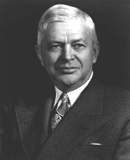Charles Erwin Wilson
| Charles Erwin Wilson | |
|---|---|
 |
|
| 5th United States Secretary of Defense | |
|
In office January 28, 1953 – October 8, 1957 |
|
| President | Dwight D. Eisenhower |
| Preceded by | Robert A. Lovett |
| Succeeded by | Neil H. McElroy |
| Personal details | |
| Born |
July 18, 1890 Minerva, Ohio, U.S. |
| Died | September 26, 1961 (aged 71) Norwood, Louisiana, U.S. |
| Resting place | Acacia Park Cemetery in Beverly Hills, Michigan, U.S. |
| Political party | Republican |
| Spouse(s) | Jessie Ann Curtis Wilson |
| Alma mater | Carnegie Institute of Technology |
| Profession | Businessman |
Charles Erwin Wilson (July 18, 1890 – September 26, 1961) was an American engineer and businessman who served as United States Secretary of Defense from 1953 to 1957 under President Dwight D. Eisenhower. Known as "Engine Charlie", he previously worked as CEO for General Motors. In the wake of the Korean War, he cut the defense budget significantly.
Wilson was born in Minerva, Ohio, the son of Thomas E. and Rosalind (née Unkefer) Wilson. After earning a degree in electrical engineering from the Carnegie Institute of Technology in 1909, he joined the Westinghouse Electric Company in Pittsburgh, where eventually he supervised the engineering of automobile electrical equipment, and during World War I, the development of dynamotors and radio generators for the Army and Navy. Wilson married Jessie Ann Curtis on September 11, 1912. They had five children.
In 1919, Wilson moved to Remy Electric, a General Motors subsidiary, as chief engineer and sales manager. By January 1941 he was the president of General Motors. During World War II, Wilson directed the company's huge defense production effort, which earned him a Medal for Merit in 1946. He was still head of General Motors when President Eisenhower selected him as Secretary of Defense in January 1953.
Wilson's nomination sparked a controversy that erupted during his confirmation hearings before the Senate Armed Services Committee, based on his large stockholdings in General Motors. Reluctant to sell the stock, valued at the time at more than $2.5 million, Wilson agreed to do so under committee pressure. During the hearings, when asked if he could make a decision as Secretary of Defense that would be adverse to the interests of General Motors, Wilson answered affirmatively. But he added that he could not conceive of such a situation "because for years I thought what was good for our country was good for General Motors, and vice versa". This statement has frequently been misquoted as "What's good for General Motors is good for the country". Although Wilson tried for years to correct the misquote, he was reported at the time of his retirement in 1957 to have accepted the popular impression.
...
Wikipedia
